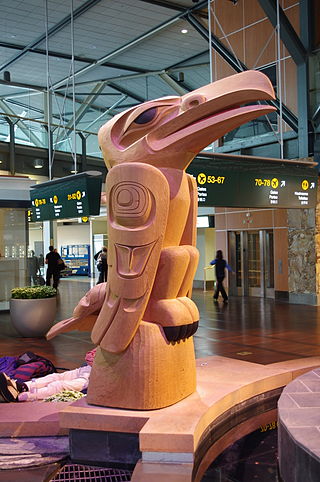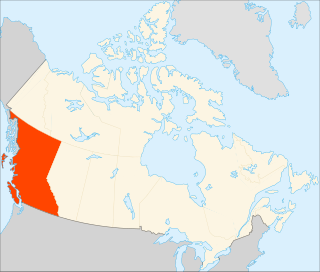Related Research Articles

The University of British Columbia (UBC) is a public research university with campuses near Vancouver and Kelowna, in British Columbia, Canada. Established in 1908, it is the oldest university in British Columbia. With an annual research budget of $747.3 million, UBC funds 9,675 projects annually in various fields of study within the industrial sector, as well as governmental and non-governmental organizations.

The UBC Thunderbirds are the athletic teams that represent the University of British Columbia. In Canadian intercollegiate competition, the Thunderbirds are the most successful athletic program both regionally in the Canada West Universities Athletic Association, and nationally in U Sports, winning 117 national titles. UBC has won an additional 21 national titles competing in the National Association of Intercollegiate Athletics against collegiate competition from the United States and 42 national titles in sports that compete in independent competitions.

Delgamuukw v British Columbia, [1997] 3 SCR 1010, also known as Delgamuukw v The Queen, Delgamuukw-Gisday’wa, or simply Delgamuukw, is a ruling by the Supreme Court of Canada that contains its first comprehensive account of Aboriginal title in Canada. The Gitxsan and Wet’suwet’en peoples claimed Aboriginal title and jurisdiction over 58,000 square kilometers in northwest British Columbia. The plaintiffs lost the case at trial, but the Supreme Court of Canada allowed the appeal in part and ordered a new trial because of deficiencies relating to the pleadings and treatment of evidence. In this decision, the Court went on to describe the "nature and scope" of the protection given to Aboriginal title under section 35 of the Constitution Act, 1982, defined how a claimant can prove Aboriginal title, and clarified how the justification test from R v Sparrow applies when Aboriginal title is infringed. The decision is also important for its treatment of oral testimony as evidence of historic occupation.

Robert Charles Davidson, is a Canadian artist of Haida heritage. Davidson's Haida name is G̲uud San Glans, which means "Eagle of the Dawn". He is a leading figure in the renaissance of Haida art and culture. He lives in White Rock, British Columbia.

Dempsey Bob, is a Northwest Coast woodcarver and sculptor from British Columbia, Canada, who is of Tahltan and Tlingit First Nations descent. He was born in the Tahltan village of Telegraph Creek on the Stikine River in northwestern B.C., and is of the Wolf clan.

The Law Society of British Columbia is the regulatory body for lawyers in British Columbia, Canada.

Mary Ellen Elizabeth Turpel-Lafond is a Canadian lawyer and law professor. She has served as a judge and as a legislative advocate for children's rights.

Steven Lewis Point, (Xwelíqwetel) is a Canadian academic administrator, criminal lawyer, and jurist. He is the current chancellor of the University of British Columbia. He served as the 28th Lieutenant Governor of British Columbia from 2007 to 2012. He also served as the chair of the advisory committee on the safety and security of vulnerable women, a committee that provides community-based guidance to the implementation of the recommendations from the Missing Women Commission of Inquiry.
Andrea Neil is a pioneer of women's soccer in Canada. Neil retired from the game after representing Canada more than any other Canadian player in history.

Higher education in British Columbia is delivered by 25 publicly funded institutions that are composed of eleven universities, eleven colleges, and three institutes. This is in addition to three private universities, five private colleges, and six theological colleges. There are also an extensive number of private career institutes and colleges. Over 297,000 students were enrolled in post-secondary institutions in British Columbia in the 2019-2020 academic year.

James McEwen is a Canadian biomedical engineer and the inventor of the microprocessor-controlled automatic tourniquet system, which is now standard for 15,000-20,000 procedures daily in operating rooms worldwide. Their widespread adoption and use has significantly improved surgical safety, quality and economy. McEwen is President of Western Clinical Engineering Ltd., a biomedical engineering research and development company and he is a director of Delfi Medical Innovations Inc., a company he founded to commercialize some results of that research and development. He is also an adjunct professor in the School of Biomedical Engineering, in the Department of Orthopaedics and in the Department of Electrical and Computer Engineering at the University of British Columbia.
Irving Kearl "Ike" BarberOC OBC was a Canadian forest industrialist and philanthropist. Though originally from Alberta, Barber spent most of his life in British Columbia, where he founded Slocan Forest Products Ltd., a lumber-producing company. He then went on to use his resource-based fortune to become one of BC's most prominent education philanthropists. Barber made significant donations to the University of British Columbia, as well as many other schools across the province, until his death in 2012.
The University of British Columbia School of Journalism, Writing, and Media (JWAM) offers a two-year Masters of Journalism program offered at the University of British Columbia's Point Grey campus in Vancouver, British Columbia. The program requires students to focus on an area of reporting specialization. The school has also developed a reputation in teaching multimedia journalism and was one of the first programs in North America to replace craft streams with an integrated journalism curriculum. The program has 60 students a year, with close to 20 faculty members, adjuncts and staff. Faculty members come from a variety of traditional and new media organizations including CBC, BBC News Online, CBS News 60 Minutes, The Globe and Mail, The Vancouver Sun, and The Tyee.
Douglas Harding Mitchell, was a Canadian Football player, executive, and commissioner.
Marion R. Buller, is a First Nations jurist (retired), practising lawyer with Miller Titerle+Co. in British Columbia and current chancellor of the University of Victoria. Buller served as the Chief Commissioner for the National Inquiry into Missing and Murdered Indigenous Women and Girls from 2016 to 2019.
Lyric Atchison is from North Vancouver, British Columbia and is a part of the Squamish Nation. Atchison was always a multi-sport athlete; she played soccer, wrestling and later on participated in rugby in 2012 at the age of 13.
Bill Wilson is a hereditary chief, politician, and lawyer. He carries the Kwak’wala name Hemas Kla-Lee-Lee-Kla. Hemas means “the Chief who is always there to help” and Kla-Lee-Lee-Kla means “the first rank among the eagles.” He is a descendant of the Musgamgw Tsawataineuk and Laich-kwil-tach peoples, which are part of the Kwakwaka'wakw, also known as the Kwak’wala-speaking peoples.

Robert George Hindmarch was a Canadian educator, sports administrator and ice hockey coach. He was a multi-sport athlete at the University of British Columbia (UBC) as a student, and returned as a professor and its director of physical education. He and Father David Bauer established a permanent Canada men's national ice hockey team based at UBC in preparation for ice hockey at the 1964 Winter Olympics. Hindmarch later coached the UBC Thunderbirds men's ice hockey team for 214 wins in 12 seasons; they became one of the first Western Bloc sports teams to play a tour of games in China. He developed additional international sporting relationships for the Thunderbirds in South Korea and Japan, and served as vice-president of the Canadian Olympic Association for 16 years. Hindmarch was made a member of the Order of Canada and the Order of British Columbia; and is inducted into the Canadian Olympic Hall of Fame and the BC Sports Hall of Fame.

Marianne Boelscher Ignace is a Canadian linguist and anthropologist. Married into the Shuswap people, she is a Full professor in the departments of Linguistics and Indigenous Studies at Simon Fraser University (SFU), and Director of SFU's Indigenous Languages Program and First Nations Language Centre. In 2020, Ignace was elected a Fellow of the Royal Society of Canada for her work in revitalizing and preserving indigenous languages.
Alfred V. Waugh is an Indigenous architect based in British Columbia. Born in Yellowknife, Waugh studied Urban and Regional Studies as an undergraduate at the University of Lethbridge, and pursued a second bachelors degree in architecture at the University of British Columbia School of Architecture. Waugh founded Formline Architecture + Urbanism in 2005, an Indigenous-owned practice. He is best known for the design of the Indian Residential School History, and Dialogue Centre at the University of British Columbia, designed alongside Manny Trinca and Vince Knudsen. Another notable project is the First Peoples House at the University of Victoria, which he designed in collaboration with Kenneth Wong.
References
- ↑ Obituary: ‘Trailblazer’ first nations judge Alfred Scow led a life of firsts -- Kwicksutaineuk-ah-kwa-mish First Nation man was most proud of his work on aboriginal issues, by Kim Pemberton, in the Vancouver Sun ; published March 6, 2013; retrieved March 24, 2016
- ↑ B.C. Judge Alfred Scow remembered as "aboriginal pioneer", by Yolande Cole, in the Georgia Straight ; published March 8, 2013; retrieved March 24, 2016
- ↑ "The Honorable Alfred J. Scow, OC, OBC".
- ↑ "Remembering" (PDF). UBC TREK. No. 33. University of British Columbia. May 2013. p. 45. Retrieved January 4, 2022.
A few years before Alfred Scow played varsity soccer and became the first Aboriginal person to graduate from the UBC Faculty of Law, he participated in an important moment in Thunderbird history.
- ↑ Profile of Judge Scow at Save Our Rivers Archived February 11, 2009, at the Wayback Machine